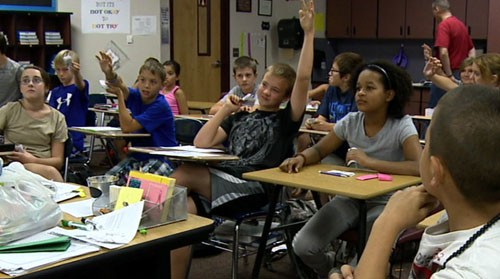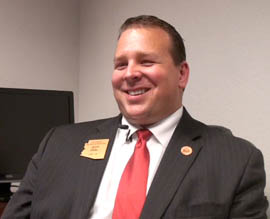Cronkite News has moved to a new home at cronkitenews.azpbs.org. Use this site to search archives from 2011 to May 2015. You can search the new site for current stories.
Lawmaker: Making kids stay in school through age 18 would cut dropout rate
PHOENIX – Requiring all students under 18 to attend school unless given parental consent would empower parents and lower the state’s dropout rate, a state lawmaker said.
“I just thought this would be a bill that says parents are going to have the power on whether their children are attending school,” said Rep. Jeff Dial, R-Chandler, author of HB 2168.
Under current state law, a student age 14 and over can drop out of school under certain circumstances – for example, if he or she is lawfully employed. Those 16 and over can drop out without parental consent or knowledge.
Dial’s bill would require all students under 18 to attend school, allowing only students ages 16 and over to drop out even with parental consent. The bill would phase in the changes over two years.
If the bill becomes law, Arizona would join 21 other states and the District of Columbia in requiring students to attend school until age 18.
According to a recent report from the National Center for Education Statistics, nearly 25,000 Arizona high school students dropped out in the 2009-2010 school year. At 7.8 percent, that made Arizona the state with the highest dropout rate.
The most recent figure from the last school year shows the rate of dropouts between grades 7 and 12 as 3.68 percent, according to the Arizona Department of Education. National numbers for the 2011-2012 school year aren’t available yet.
The prospects for Dial’s bill seemed uncertain after it received a lukewarm reception Monday from the House Education Committee, which decided to hold it.
Rep. Justin Pierce, R-Mesa, was among the committee members who said they were unsure whether the legislation would truly achieve Dial’s goal.
“I guess I’m not convinced this really does empower the parents,” Pierce said during the meeting.
Pierce and some other committee members also said they were worried about the effects of requiring students to be in the classroom if they don’t want to be there.
Three experts echoed those concerns in phone interviews.
Connie Harris, a education clinical assistant professor at Arizona State University and a former school administrator, said that while mandates may communicate a goal that makes sense, the reality might be much more difficult to attain.
“Having been on the other end – the actually trying to implement – when students quit going to school and their parents support that, a mandate is not a positive line of getting those students back into school,” she said.
Harris said the dropout problem could be better addressed by channeling students into programs that keep them engaged in education. Technical programs, career-related courses and online classes give students options that can make education more interesting and applicable to their lives.
She also said dropout rates can vary greatly from school to school and that each community should be able to address the problem in its own way.
Laura K. Bosworth, a University of Arizona education professor, said targeting at-risk students would be a better way to lower the dropout rate.
“I think what needs to be looked at is a profile of who’s dropping and what needs to be done to make them find school meaningful,” she said. “Just forcing people to stay doesn’t work.”
The Dropout Prevention & Recovery Group LLC, a program funded by the Arizona Department of Education, works with schools and students to prevent dropouts. CEO Jim Lee said the bill is “not the magic bullet” and wouldn’t help students at the highest risk of not completing school.
“It’s throwing a Band-Aid on a gaping wound instead of really solving the problem,” he said.
Andrew Morrill, president of the Arizona Education Association, the state’s largest teachers union, said said keeping students in school longer could affect the quality of education for all students by resulting in more disciplinary problems.
“If that’s your only approach I don’t think we’ll see big changes,” he said.
In an interview, Dial said he would work with other representatives on his legislation to make sure parents have control over their children’s educations.
“My goal is just to make Arizona the best place to live, work and raise a family,” he said.









